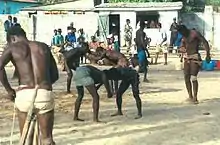Traditional games of Nigeria
Nigeria has several traditional games, though they have faded away due to lack of support and the dominance of Western sports.[1] Traditional games historically played a significant role in teaching Nigerian children about the structure of their societies.[2]
History
Several traditional Nigerian games are played at the National Sports Festival of Nigeria.[3]
Traditional games
Abula
Abula is similar to volleyball, except that participants hit the ball with a wooden bat.[4][5]
After round one
After singing a song with the opening line "after round one", players have to display a number from one to five using their fingers; the person who displays the lowest numbers of fingers has their palm slapped by all the other participants.[6][7]
Langa
Langa is played in rounds; in each round, one player from each team, known as the Ruwa (point-scorer), attempts to reach a designated point on the opponent's side in order to score a point for their team. The Ruwas and all other players have to hop on one foot, while holding their other foot with one hand. If a player's hand is dislodged from their held foot by an opponent, then they are eliminated from that round.[8][9]
Ten Ten
Two participants stand opposing each other, and then lift one of their legs up; if a player lifts the same leg up as the opponent, then the opponent wins a point.[10]
Kpokoro
Kpokoro is a version of Ten Ten which involves multiple players, and also resembles follow the leader.[11]
Board games
Ayoayo
Ayoayo (Yoruba: Ayò Ọlọ́pọ́n) is a traditional mancala played by the Yoruba people in Nigeria. It is very close to the Oware game that spread to the Americas with the atlantic slave trade. Among modern mancalas, which are most often derived from Warri, the Kalah is a notable one that has essentially the same rules as Ayoayo.
There are games with identical rules also in other areas of Africa. One such game is the Endodoi, played by the Maasai people of Kenya and Tanzania.Martial arts
Dambe
Kokawa

References
- "A Look at Nigeria's Traditional Sports and its Quagmire — Transcontinental Times". 2021-12-14. Retrieved 2023-08-25.
- akande, segun (2017-07-10). "Before Playstation and X-Box, we had Suwe, Ten-Ten and Table Soccer". Pulse Nigeria. Retrieved 2023-08-25.
- "Sports ministry reinstates traditional sports in 2022 National Sports Festival - Daily Trust". dailytrust.com. Retrieved 2023-08-25.
- A Step towards Improving Ncho Traditional Game in Anambra State https://www.researchgate.net/ Theresa Nkiru Uzor
- "Top 4 Nigerian Traditional Games to Try". Encomium. 2015-10-02. Retrieved 2023-08-25.
- Agboke, Anuoluwapo (2018-10-18). "Nigerian Kids Games: Throwback Thursday". Hintnaija. Retrieved 2023-08-25.
- Auwal, Abdul (2022-06-03). "When We Were Young: 7 Nostalgic Games We Played - TheWill Downtown". Retrieved 2023-08-25.
- "Langa: A culture going extinct - Daily Trust". dailytrust.com. Retrieved 2023-08-25.
- "LANGA. The hopping sport. — izge on Scorum". Scorum.com. 2018-07-02. Retrieved 2023-08-25.
- Nwangwu, Adaora (2022-01-27). "Throwback: 15 Memorable Games Nigerian Kids Played In the 90s". The Culture Custodian (Est. 2014.). Retrieved 2023-08-25.
- "An Analysis of Children's Games from Around the World | Bits And Pieces". Global Toy News. 2022-03-04. Retrieved 2023-08-25.
- A Note on the Current Status of Arin, a Yoruba Traditional Game Played with the Seeds of Dioclea reflexa. https://www.researchgate.net/ Toye Ekunsanmi
- Nigeria, Guardian (2016-07-31). "These acts diminish us". The Guardian Nigeria News - Nigeria and World News. Retrieved 2023-08-25.
- Iyorah, Festus (June 18, 2018). "Dambe: How an ancientian boxing swept the internet". Al Jazeera. Retrieved June 18, 2018.
- Bole/English wordlist:ucla.edu
UCLA Hausa teaching resources: hausarbaka. - "Initiation wrestling in Togo". 10 September 2019. Retrieved 2019-09-10 – via The African.